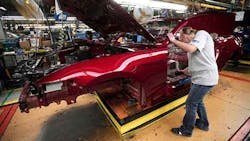Automakers Miss March Sales in Sign Rapid-Growth Era Nears End
For the past couple of years, automakers have helped keep the economy going as confident consumers raced to replace their aging rides with more luxurious cars and sport utility vehicles. That torrid growth is starting to level off.
All three U.S. automakers posted sales gains that missed analysts’ estimates in March, while Japan’s Toyota Motor Corp. reported a surprise decline. General Motors Co. estimates the industry sold cars at an annualized rate of about 17.1 million vehicles -- healthy by historical comparisons but the slowest pace since June.
Add in the fact that some automakers are starting to spend more on sales incentives and making longer-term loans, and it’s clear that executives are no longer counting on rip-roaring demand. It also brings the industry more into line with an economy that has been logging steady but not stellar growth.
“It certainly is a comedown from the sales pace of last year,” said Mark Wakefield, a managing partner at consulting firm Alix Partners who predicts industrywide sales may rise about 2% from 2015’s record. “into that normal rate of employment where we’re no longer trying to get a lot of people back to work.”
Consumer confidence in the U.S. dipped slightly in March -- a third straight decline -- as concerns persisted that the world’s largest economy will cool. That sentiment may shift after April 1 jobs report showed climbing U.S. employment and a pickup in wages.
Trailing Forecasts
Even with relatively cheap gasoline stoking consumers’ demand for SUVs and pickups, GM, Ford Motor Co. and Fiat Chrysler Automobiles NV all fell short of sales estimates for the month. The shares of all three companies declined, led by a 4.3% drop at Fiat Chrysler.
The sales report “plays into the idea that with 2015 being a record year, maybe we’re set up to start peaking a little bit in terms of consumer demand," said Kevin Tynan, auto analyst for Bloomberg Intelligence.
The annualized selling rate, adjusted for seasonal trends, may have been unchanged from a year earlier at 17.1 million, GM said, after analysts had projected a 17.3 million pace for the month. Fiat Chrysler suggested it could be even lower. Last year, the industry sold a record 17.5 million vehicles.
Key Results
Ford’s light-vehicle sales -- excluding its heavy trucks -- rose 7.8% to 253,064, topping GM’s 252,128. Ford was helped by selling more cars to corporate and rental fleet customers.
GM’s increase was less than 1%, far short of the projected 6%, as it pulled back on sales of low-margin cars to rental fleets.
Fiat Chrysler’s U.S. sales rose 8.1% in March, on the strength of Jeep sport utility vehicles and Ram pickups. The company’s car sales fell 34%.
Toyota was expected to post a 5.6% gain, but sales fell 2.7%.
Honda Motor Co. missed the forecast of a 16.1% increase, rising 9.4%.
Nissan Motor Co. was an exception, with a 13% sales gain that beat expectations. Its deliveries reached 163,559 cars and light trucks.
Volkswagen AG’s namesake brand dropped 10%, declining for a fifth straight month after regulators revealed in September that it cheated on engine tests.
“Make no mistake about it, a 17 million unit SAAR is a pretty darn good industry," said Randy Parker, vice president of Infiniti Americas, Nissan’s luxury brand. “It’s just going to be up to us that we get our unfair share."
Consumer Loans
Changes in the way consumers are buying vehicles suggest more people are stretching payments out to make them more affordable. There was an increase in March in the number of people buying cars with six-year loans.
“There are some reasons for concern for sure,” said Rebecca Lindland, an analyst with Kelley Blue Book, an automotive price research firm in Irvine, Calif. “We’re seeing more incentives and longer loan terms. I’m a little concerned that some consumers could be overextending themselves.”
Jeff Schuster, senior vice president of forecasting for LMC Automotive, was the only analyst to accurately forecast softer auto sales. He cautioned that the market and the economy are still pretty strong and that one month doesn’t mean there will be a decline.
“I think we will see slower growth rates and more volatility for the rest of the year," Schuster said. While automakers now face tough comparisons to strong months in 2015, demand is still healthy and "it’s nothing to get alarmed about. All eyes will be on April sales."
About the Author
Bloomberg
Licensed content from Bloomberg, copyright 2016.
